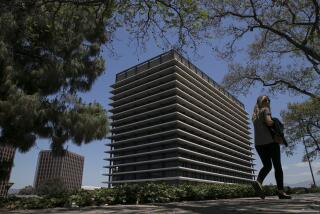Those ads ripping Garcetti on homelessness? They’re about fighting his Green New Deal
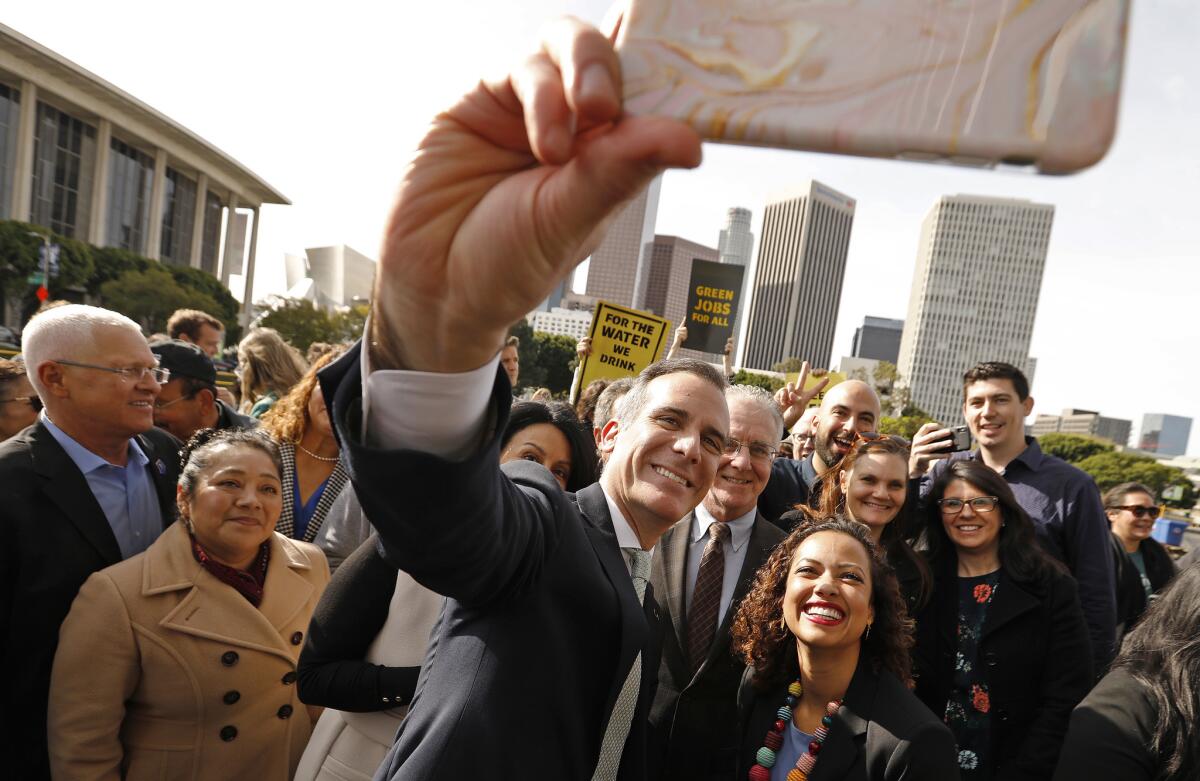
When Eric Garcetti ran for mayor six years ago, he rode a wave of anger over the political power wielded by the union that represents workers at the Department of Water and Power — and later vowed to reform the agency that Los Angeles residents love to hate.
That effort has since been eclipsed by a homelessness crisis that has brought tents and encampments to nearly every corner of the city.
Now, as he faces mounting anger over the crisis, Garcetti is locked in a rematch with the International Brotherhood of Electrical Workers Local 18. Union leaders have launched a frontal assault on Garcetti’s sweeping environmental plan — and are using homelessness as a cudgel.
Working Californians Research Fund, a nonprofit operated by IBEW Local 18, has run television and radio commercials attacking Garcetti over the homelessness crisis and his Green New Deal, a package of proposals to address climate change locally. Those initiatives would eliminate thousands of jobs amid a serious housing crisis, the group said.
On Facebook and Twitter, the group also has warned that Garcetti’s green plan could double electricity rates and “dramatically increase” gasoline prices for drivers. And DWP workers have picketed Garcetti events, carrying signs that call the Green New Deal “a raw deal” for workers and ratepayers.

Driving much of the opposition is Garcetti’s plan to close three DWP plants powered by natural gas, a planet-warming fossil fuel, over the next decade. The plants employ more than 400 DWP workers. Brian D’Arcy, IBEW Local 18’s top executive, has seethed over the move to close the plants, calling the idea “pie-in-the-sky nonsense.”
It’s “so blatantly political,” he said in an interview in April, as workers chanted “Garcetti’s got to go!” on the street behind him. “All he wants to do is sign the [Green New] Deal so he can be along with the left wing of the Democratic Party.”
The IBEW campaign is built around the idea that City Hall and Garcetti in particular are incompetent and failing to live up to their promises, said Zev Yaroslavsky, who heads the Los Angeles Initiative at the UCLA Luskin School of Public Affairs. Because the gas plants aren’t mentioned in the ads, “unless you’re on the inside, you don’t really know what this is all about.”
“You don’t know that it’s about shutting down fossil-fuel-powered plants in the basin,” said Yaroslavsky, a former L.A. councilman.
The campaign could weaken Garcetti if he chooses to run for another political office, a way for the union to exact revenge on a longtime foe. When Garcetti ran in 2013, a political action committee tied to the DWP union spent more than $3.8 million to attack Garcetti and back his opponent.
Garcetti turned the expensive ad blitz against the union, portraying rival Wendy Greuel as someone incapable of standing up to IBEW Local 18.
The latest clash reflects a broader schism among groups important to the political left — labor unions and environmentalists — over climate change policy.
Working with fossil fuel interests
Some organized labor groups have embraced the Green New Deal concept promoted by U.S. Rep. Alexandria Ocasio-Cortez (D-N.Y.), which would link environmental progress to economic equality and workers’ rights.
But unions that represent construction workers and utility employees have come out swinging against Green New Deal-type initiatives that they argue put jobs at risk. D’Arcy has warned that green policies like Garcetti’s could drive his members away from the Democratic Party.
In the San Fernando Valley, a political arm of IBEW Local 18 is already backing the Republican candidate running in an Aug. 13 special election for a seat on the City Council.
With financial support from the fossil fuel industry, the Working Californians political action committee has spent more than $57,000 supporting John Lee, a former council aide who voiced concerns about whether closing the plants could hurt ratepayers. Lee is running against college educator Loraine Lundquist, a Democrat who backs the decision to phase out the three plants and has made fighting climate change part of her campaign.
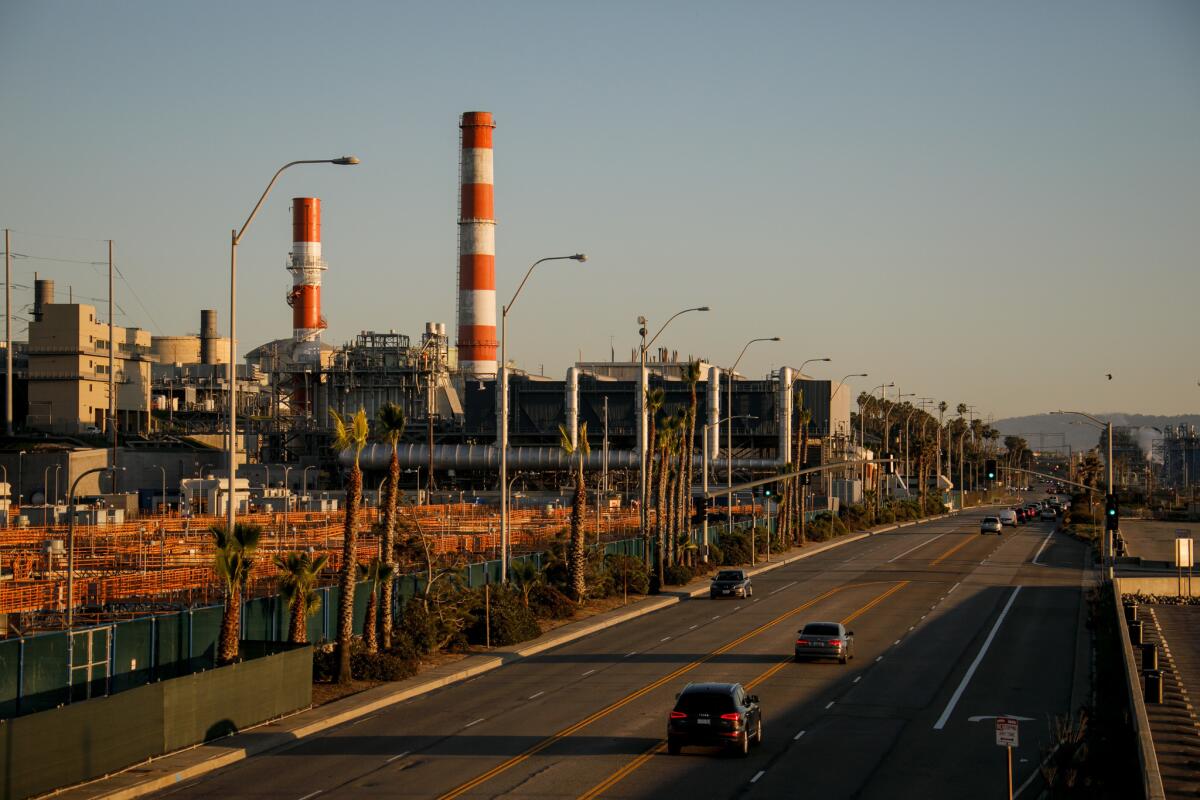
Garcetti announced in February that he had abandoned plans for rebuilding the Scattergood, Haynes and Harbor generating plants along the Pacific Coast, billing the move as a way to continue shifting the electrical utility off fossil fuels and onto renewable energy.
The mayor made his decision despite DWP executives’ previously arguing that the plants would be needed to keep a reliable source of electricity flowing to customers.
Garcetti spokesman Alex Comisar said none of the workers at those plants will lose their jobs. The mayor is expected to have a more detailed plan for replacing the energy from the three plants — and for moving the utility to 100% renewable energy — early next year, Comisar said.
“Despite the DWP union super PAC’s ads, Mayor Garcetti remains committed to his DWP reforms to reduce emissions, keep rates low, and protect and create jobs,” he said in an email.
Seven-figure ad buy
Environmentalists argue that in a state already suffering from deadly wildfires, Garcetti’s push to phase out fossil fuels is a matter of life and death. They contend the DWP’s workforce will ultimately benefit from a transition to renewables.
“Imagine all the money that we can invest in our local economy if we re-power with something new — and all the jobs we can create,” said Aura Vásquez, a former DWP commissioner now running for a council seat in Koreatown and South Los Angeles.
Vásquez said she tried to speak to D’Arcy at a reception at the California Democratic Party convention this year. When she greeted him, he accused her of being “irresponsible,” telling her that her actions would cost workers their jobs and result in power outages, she said.
D’Arcy walked away before she could respond, Vásquez said. His representatives did not comment on her account.
A Working Californians representative would not say how much the group had spent on the ads, indicating only that it was more than $1 million. The TV ads went on the air June 1, warning of higher taxes just days before voters crushed Measure EE, a new tax championed by the mayor to fund L.A. public schools.
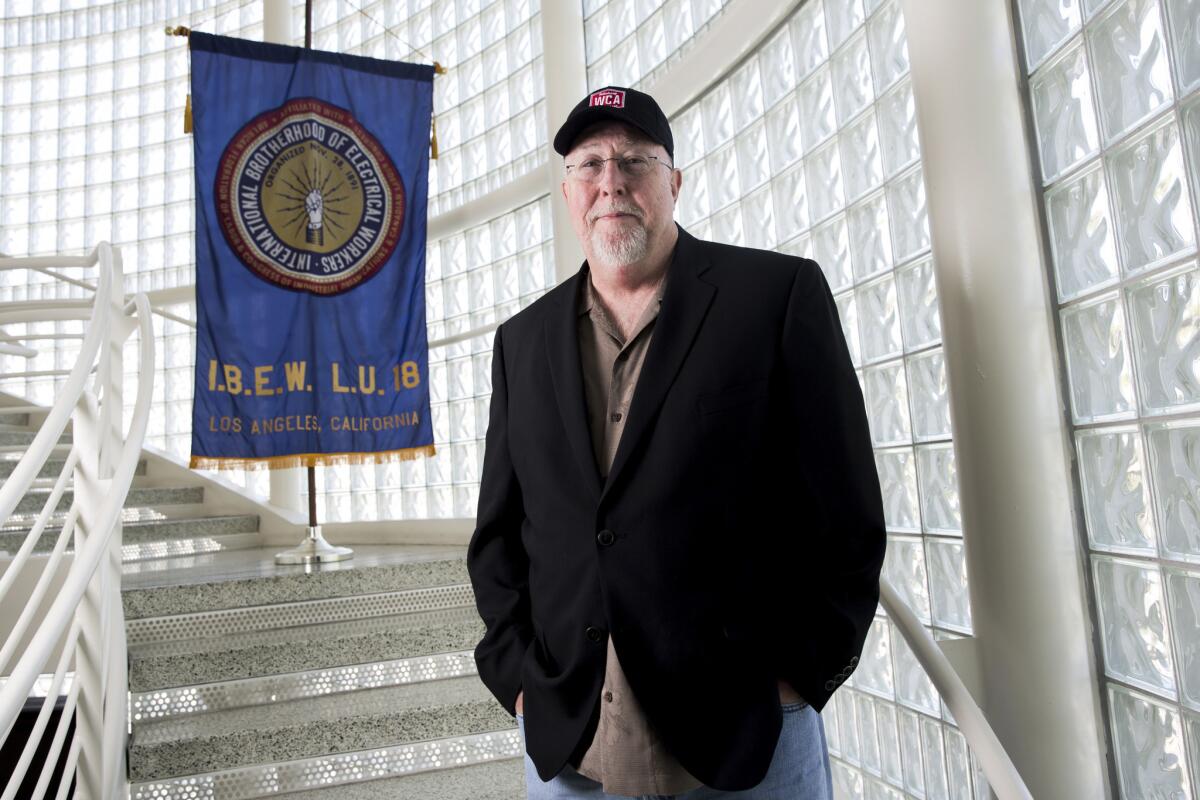
The commercials did not specifically mention the DWP, simply citing higher utility rates and “green taxes.” Asked what that referred to, Working Californians spokesman Michael Trujillo pointed to a handful of ideas in Garcetti’s Green New Deal, such as a proposal to explore “congestion pricing” that would charge drivers to enter traffic-choked areas.
The group has also contended on Twitter that continuing to produce energy locally is good for national security — an argument frequently made by the oil and gas industry to oppose efforts to curb petroleum production.
But in interviews, D’Arcy has focused squarely on the gas plants, arguing that Garcetti needs to reverse his decision and warning that a shutdown will pose a series of problems.
D’Arcy said solar and wind power will require enormous amounts of land for batteries and leave the utility with “basically a toxic waste dump” once the batteries are no longer usable. He also cited a study commissioned by the DWP that said replacing all three plants with clean energy could cost $5 billion.
Above all, D’Arcy said, the three plants keep electricity flowing to L.A. homes and businesses.
“That’s why the lights stay on,” he said.
DWP officials disputed those claims. They said the costs cited by D’Arcy are based on outdated assumptions and don’t take into account recent policy developments, including a state law requiring utilities to get 100% of their electricity from climate-friendly energy by 2045.
Utility officials said that they’re working with the National Renewable Energy Laboratory to study possible pathways for phasing out fossil fuels, and that it’s too early to say exactly what combination of renewable energy facilities, transmission lines and energy storage will win out.
Los Angeles already gets about one-third of its electricity from renewables, and the costs of clean energy keep falling.
Blaming the mayor
DWP commissioners are expected to approve a 25-year contract this month for solar power and energy storage from a project in Kern County, with the solar priced at less than 2 cents per kilowatt-hour — a record-low price for a U.S. solar farm, according to utility officials.
And backers say the DWP has time to figure out how to replace the three plants. The Scattergood plant can keep operating until 2024 under state environmental rules, and Haynes and Harbor don’t have to shut down until 2029.
Chris Roth, a community organizer with the activist group Ground Game L.A., said that much of the blame for the union backlash lies with the mayor, who failed to explain what kind of job the displaced workers would find during and after the transition.
“The impression the workers had is that he did not consider them in this move at all,” said Roth, who is running for state Assembly in a district that includes downtown.
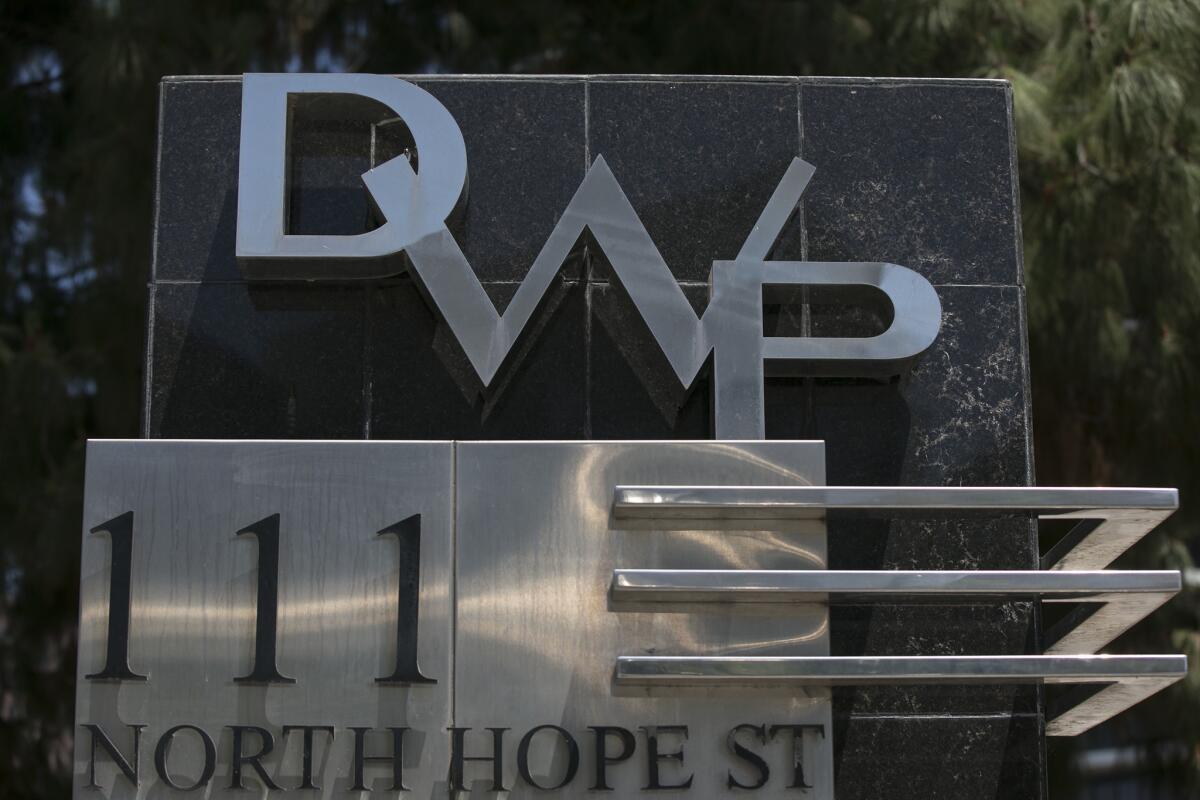
Comisar, the mayor’s spokesman, said in an email that Garcetti staffers met several times with DWP union representatives to discuss their plans in the months leading up to the mayor’s announcement.
“We continue to have conversations with union representatives, and will always maintain an open dialogue with the DWP union,” Comisar said.
Not all labor groups oppose Green New Deal-type policies.
Last month, the Service Employees International Union approved a pro-Green New Deal resolution. So did the Los Angeles County Federation of Labor, which said in a March resolution that it supports “a Green New Deal or similar effort that provides career opportunities for people of color, low-income communities and women ... that simultaneously protects existing union jobs.”
Last month, the federation was also poised to endorse Lundquist, the council candidate running against Lee, according to two people familiar with the process. But IBEW representatives proved instrumental in preventing her from getting the prized endorsement, the two sources said. Federation officials declined to comment.
Yaroslavsky, the UCLA instructor, said Garcetti cannot afford to back away from his plan for the three gas plants. But the IBEW ad campaign may also be aimed at council members, who could ultimately weigh in on the mayor’s plan, Yaroslavsky said.
The message from the union, Yaroslavsky said, may be: “This is what we’re doing to the mayor. Imagine what we can do to you.”
More to Read
Sign up for Essential California
The most important California stories and recommendations in your inbox every morning.
You may occasionally receive promotional content from the Los Angeles Times.
